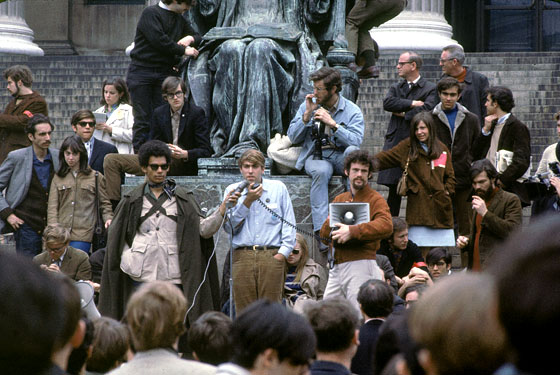
Forty years ago this week, students at Columbia occupied five university buildings, including the president’s office in Low Library, to protest the school’s participation in a Defense Department think tank and a plan to build what the students called a “racist” gym in Morningside Park (neighborhood residents were to have a separate entrance). Mark Rudd, chairman of Columbia’s chapter of Students for a Democratic Society, emerged as spokesman for the protesters. A week later, when the NYPD raided the buildings and ended the takeover, more than 700 students were arrested and 150 injured. Rudd was eventually expelled. He lives now in Albuquerque, New Mexico, where he retired last year as a community-college math instructor. He spoke to Jesse Oxfeld from his mother’s apartment in New Jersey, on his way to a reunion in Morningside Heights.
It’s been 40 years since you led the revolt at Columbia.
I think you have a misconception about leaders. The media picked me as “the leader.” Movements are not made by leaders. Movements are made by hundreds of thousands of people deciding to take action. And the media comes along and says, “This person led it.”
Well, you were the chairman of SDS at Columbia.
A leader is someone who tells other people what to do or who devises strategy. I more embodied and expressed the feelings of many, many people. But the media needs people. They can’t say, “This was about racism in society”; they have to say, “This was about Mark Rudd’s leadership.”
Things ended badly—many arrests, many injuries. But the gym project was halted, and ties were severed with the Institute for Defense Analyses. So was it a success?
It would have been a success no matter what, because from the point of view of Columbia SDS, the goal was always the creation of a radical mass movement. People understanding and acting on U.S. imperialism in all its manifestations—against the war in Vietnam, against domestic racism, for justice in the world. And that we accomplished.
But 40 years later, we’re in an unwinnable, unpopular foreign war. Columbia just got permission to expand into 35 acres of Harlem …
It seems very similar, doesn’t it? I don’t live in New York anymore, but people tell me that Harlem as a black community has pretty well been decimated or is being decimated by gentrification. Within the context of that process, it would make sense that the community is not fighting this essentially racist institution.
Why aren’t today’s students protesting more?
They don’t know how. When I got to Columbia in 1965, I found a full-blown antiwar movement—and that movement had a model of organizing. It came from the civil-rights movement and the labor movement. People understood organizing. There’s been a 40-year break, about two generations. Young people haven’t been exposed to any successful model, so they are trying to reinvent it. And a bigger reason is the transformations of our culture. Young organizers tell me that they hear constantly—and I hear this, too—“Nothing I do can ever make a difference.” Back in ’68, I never once heard that. Because it was patently obvious that the opposite was true.
Have good intel? Send tips to intel@nymag.com.